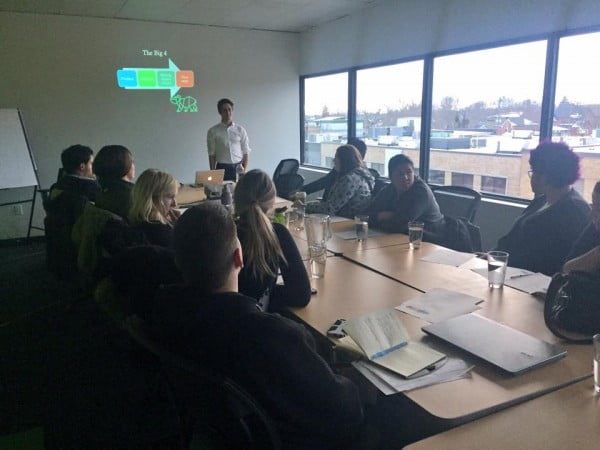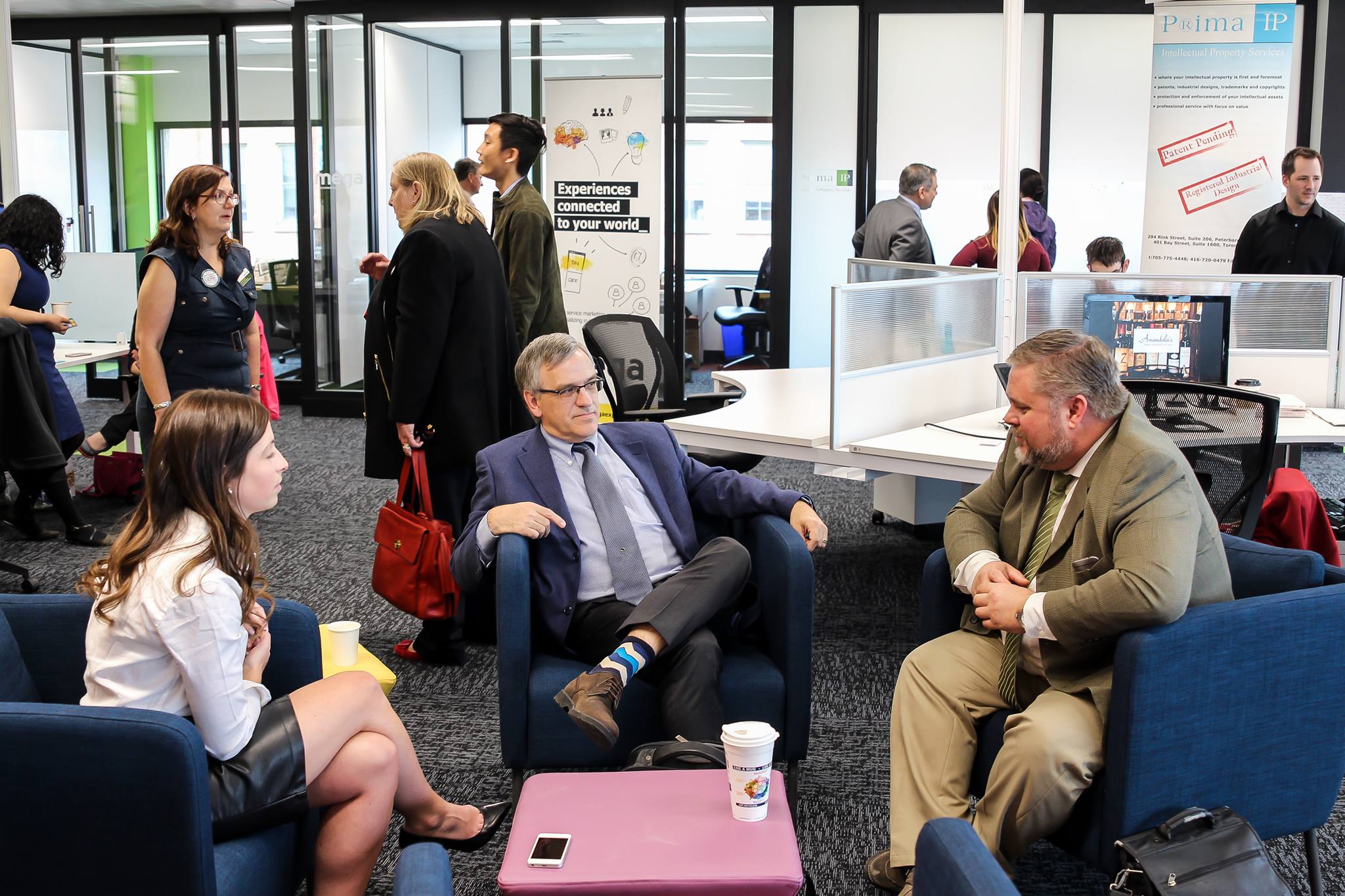
Startups, How Bad Do You Want It?
Let us help you shape the future with your business innovation – APPLY NOW
Thank you to our Knowledge Partner Birchbark Media for filming this incredible video!
Visit Birchbark Media today.

Let us help you shape the future with your business innovation – APPLY NOW
Thank you to our Knowledge Partner Birchbark Media for filming this incredible video!
Visit Birchbark Media today.


If you’re a startup, you don’t need an article or blog post telling you that your business ideas need to be original, useful, and well, amazing to catch the world’s attention.
You know that, and you know your business plan will execute it all. So when you’re in deep thought about what makes your startup unique, think broader than just your business’ product or service, because when it comes down to it, all past successful startups provide the same type of service that people love so much – saving time.
think broader than just your business’ product or service, because when it comes down to it, all past successful startups provide the same type of service that people love so much – saving time.
Nowadays, all people want to do is save time, no matter what they are doing. From automatic doors to an angry emoji, basic and complex technology is working together so humans have less work to do.
The reality is, if technology disappeared, we’d all be lost, and most of all, we’d notice how much extra work we were putting in to accomplish even the simplest of tasks. We rely on technology for online banking, obtaining world news, and the list goes on.
Gaining such reliance on technology isn’t known as the best quality of this generation, but it is prime time for tech entrepreneurs to make it big with their innovative ideas.
Spotify is a good example of a tech innovation that saves time for users. No one wants to pay three dollars for an individual song. So when Spotify came out, people could instantly have access to millions of songs for a small fee.
And what do people want to save as much as time? Money.
Instead of making that long-distance call, you now can use Skype. Why pay full price when there are sites like Groupon? And who even has cable anymore when all the good shows are waiting on your Netflix account (or your friends account you haven’t logged out of)!
Convenience here is also key. Saving time and money is great for anyone, but if you’re making the user do more than signing up an account for your business, y ou may scare them away.
ou may scare them away.
Think of an app like Uber. Uber on average is a cheaper alternative to a taxi service, but what made it even more popular is the process of ordering one. All users had to do was download an app and account, so getting a guarunteed ride in 10 minutes was just a click of a button away.
So, if you’re an entrepreneur in this digital age, remember – if your startup can save a person time, money and overall be convenient to the customer, you are on the right track, keep hustling.
Are you a tech entrepreneur?
Learn more about how we help ag-tech, clean-tech, healthcare and digital startups grow
throughout Peterborough and the Kawarthas and accelerate worldwide HERE.


You’ve perfected your business plan, have your product prototype, and have successfully tested the market. Now, your ready for some investment to take your innovative business to the next level!
But wait. . .how?
You have about 10 – 20 minutes standing in front of Angel Investors and if you pitch right, your business may just have the chance of a lifetime to scale high.
Being a client at the Innovation Cluster provides a lot of perks. You are working steps away from staff who are ready to help you with any situation, one of them being your helpers in preparing for pitching to investors – call us gatekeepers, if you will!
Did you know that the Peterborough Region Angel Network is one of our Industry Partners? The Angels know how important it is for a startup to work with an incubator before pitching to angel investors. Therefore, anyone who is interested in pitching to the Peterborough Region Angel Network must come to the Innovation Cluster first!
The staff at the Cluster have helped many clients perfect their pitch and make sure their business is ready for the stand.
Here are 7 things to keep in mind as you prepare for pitching to the Angels. . .
 trying to build your business. Do you already have clients on board? Do you have an online following begging for your product to be public? These achievements are important, and can help identify what the future of your business will look like if given an investment opportunity.
trying to build your business. Do you already have clients on board? Do you have an online following begging for your product to be public? These achievements are important, and can help identify what the future of your business will look like if given an investment opportunity. don’t have a team, you can’t be a one-man-show forever if you want your startup to expand. So whether you’re going into the pitch as a team or as an individual, you’ll need to be able to show investors how you’ll continue to attract talented, innovative and skilled people to your business, so your startup will continue to thrive. Remember – collaboration = innovation.
don’t have a team, you can’t be a one-man-show forever if you want your startup to expand. So whether you’re going into the pitch as a team or as an individual, you’ll need to be able to show investors how you’ll continue to attract talented, innovative and skilled people to your business, so your startup will continue to thrive. Remember – collaboration = innovation.Are you a client of the Innovation Cluster?: If you think you are ready for pitching to the Angels, you’ll need to come to us first. This list is the foundation of preparing for your pitch, but there’s always more to be done. And as an entrepreneur, we know you’re used to that. So stop by our office and we’ll help you prepare for the best pitch the angels have ever heard! 😎
Have a company and want to join the network of entrepreneurs in the Innovation Cluster? APPLY TODAY


Being an entrepreneur is hard work and takes a lot of growth personally and professionally to reach success for a new business. As an incubator for entrepreneurs to start and grow their business, we know one of the most important qualities for our startups to have is the motivation and willingness to learn in order to reach success.
Here are some reasons why the Innovation Cluster’s entrepreneurs are lifelong learners.
Our Entrepreneurs. . .
1: Never Miss An Opportunity
Always wanting to grow their knowledge, entrepreneurs seize every moment of their day and keep their eyes open for what event may be an opportunity where the average person may not notice. For example, when meeting a stranger, entrepreneurs don’t just introduce themselves, they use it as a chance to network with a new person. Meeting someone in a career like theirs could help their business further on, and if the person lives a completely different lifestyle, it’s seen as an opportunity to learn about new topics.

At the Innovation Cluster, we know how important it is to network, so we host events like E-Connect for the community to learn about the small businesses around them and so entrepreneurs can make connections with new locals.
2: Know the Benefits of Teamwork
Entrepreneurs work well independently as they are creative sorts, but understand what scales a business upwards most is efficient teamwork. Collaborating with people who have different visions, experiences and knowledge will create a business that provides the best for consumers, and that is exactly what an entrepreneur strives for.

Inside of the Cluster’s incubator The Cube, startups get to work side-by-side with other companies, and find it beneficial to learn from one another when another company has recently solved that bump in the road they are encountering.
3: Use Modern Technology to Their Highest Potential
You’ve likely heard the saying, “We have the world of information at our fingertips on the internet but instead we spend our time watching videos of cats.” Well not entrepreneurs! Technology is the biggest advantage for people trying to start their business in today’s world. When it comes to self-learning, it has never been easier! Entrepreneurs have a lot on their plate and know just how much the internet can help.
The Innovation Cluster is technology-based innovation, so you would see most of our client’s using computer, manufacturing and VR technology on a regular basis, researching how to advance these products and use them to their company’s benefit.
Getting @OCEinnovation Discovery started off right with some #VR artwork! ⚡️ #OCEdiscovery #innovation #tech pic.twitter.com/dzEGNtu6mM
— Innovation Cluster (@InnovationPtbo) May 15, 2017
4: Use Personal Time to Grow Knowledge in New Things
 Entrepreneurs don’t only use technology to their advantage, they utilize any spare time they have in a day. Everyone has spare time, even if it is “wasted” on the long drive to work, waiting in a doctor’s office, or watching your food cook. Entrepreneurs motivate themselves by knowing the benefits of good time management, both for themselves and the future of their business! They get creative by listening to informative podcasts while driving, reading a page of a book they carry around when they are stuck waiting in line, or get inspired by their surroundings, whether people they talk to or an article shared online.
Entrepreneurs don’t only use technology to their advantage, they utilize any spare time they have in a day. Everyone has spare time, even if it is “wasted” on the long drive to work, waiting in a doctor’s office, or watching your food cook. Entrepreneurs motivate themselves by knowing the benefits of good time management, both for themselves and the future of their business! They get creative by listening to informative podcasts while driving, reading a page of a book they carry around when they are stuck waiting in line, or get inspired by their surroundings, whether people they talk to or an article shared online.
We never hear our entrepreneurs sitting around saying they are bored. They are constantly thinking on how they can be better in every aspect of their life each day. In The Cube our Innovation Specialists are always meeting with company’s to ensure they are staying on the right path of being motivated and using their time to stand out from other businesses.
5: Accept Criticism and Use it to Grow
After working hard on a project then have someone say it needs work, or maybe even a huge re-do, it can be hard to change perspective to see it in a new light. But honestly, good criticism can take a business a long way. Entrepreneurs recognize failure as another word for try again.
“Success is walking from failure to failure with no loss of enthusiasm.” — Winston Churchill
An entrepreneur can’t fully make it on their own without some support in growing a business. Being a startup in an incubator like The Cube provides workshops such as a Path to Building a Successful Business, where entrepreneurs are challenged to consider each section of their business model canvas and make sure they are setting the right foundation for their business to successfully grow.
Our awesome clients are learning all about #digitalmarketing & #socialmedia today! 📱 #innovation #entrepreneur pic.twitter.com/ubVrUUlKqW
— Innovation Cluster (@InnovationPtbo) May 30, 2017
6: Want to Learn More Than the “Bare Minimum”
Independent entrepreneurs may go by the title Founder, CEO, or President when first starting out, but reality is they cover all positions when first starting their own business. There’s operations, finance, marketing, communications, manufacturing, and they must understand it all. It sounds overwhelming, but what makes a true entrepreneur is the willingness to learn new things outside of their comfort zone.

In an incubator like The Cube, startups have resources and tools to learn the basics of each section of growing a business, but at the end of the day it is up to them to lift the bar higher to execute those resources and succeed in every section of their business.
7: Enjoy a Good Challenge
No one enters the life of an entrepreneur who wants the same routine everyday. Each event brings a new problem they need to solve, some harder than others. As these entrepreneurs face these challenges, they learn how to overcome the problem and in return their knowledge, experience and business get stronger because of facing those challenges head on.
The Innovation Cluster provides workshops called Hands-ON that feature topics for entrepreneurs to conquer challenges and overall be successful. For example, our most recent workshop was “How To Be Happy” as an entrepreneur, hosted by knowledge partner Inclusive Advisory.
Hosting our Hands-ON workshop with Dr. Michael Konopaski about the road to #happiness for #entrepreneurs! 😎 pic.twitter.com/s7fyLoacmS
— Innovation Cluster (@InnovationPtbo) May 31, 2017
8: Remove the Barrier Between Their Professional and Personal Life
In today’s society, people tend to focus more on either their professional or personal life, often struggling to find a happy balance between both. Entrepreneurs start out on the right path to finding a balance as they are creating a business which they are passionate about and have their own voice and schedule. By choosing this lifestyle, they give themselves more opportunity to thrive in both aspects and open up doors for more learning as they don’t feel trapped in one section of their life.

9: Are Coachable
Entrepreneurs have every opportunity to seek out experienced and established business professionals in all aspects of the working world to take note of their success and learn.

At the Innovation Cluster, we have an abundance of connections to knowledge partners that are eager to help startups grow their business and find their best path to market. A range of knowledge from the partners are available to our clients whenever they have questions or concerns, and know how important it is to seek help rather than go alone off assumptions.
10: Know if They Aren’t Getting Better, They’re Getting Worse
In a world of competition and used-up ideas, entrepreneurs need to stay on their toes and take inspiration from the abundance of businesses and advancements around them to better their own creations. The world is advancing fast, and it’s not waiting for entrepreneurs to catch up.

It might seem like every idea has been used, but here at the Innovation Cluster, we believe ideas can always be turned into greater ideas, and our entrepreneurs have that mindset too. We have clients advancing the food, clothing, tech, healthcare industry and beyond.
At the Innovation Cluster, the possibilities are endless!


Don’t throw out the drawing board anytime soon. Even when something becomes successful, advancements are still made. There’s going to be alterations, and sometimes the original idea becomes a whole new concept. Don’t let the changes cause doubt, it just means you’re getting another step closer to success.
With the Cluster, learn how to focus on what’s important about your company and what you really want to achieve. You don’t have to have every detail perfect going in, but you do have to be motivated to make it better every day.

It will start the stepping-stone of getting your name out and how much people actually like your idea. Pitch your idea to your family, friends, and the neighbor who walks his dog down the street every day. It will help you form an idea about who is interested in your product, what’s appealing about your idea, and what’s not, for when you work on your business model.
A website, logo, or social media platform shows that your idea is not only real, it shows that it’s happening. An idea will sound interesting for a moment, but marketing shows it’s here to stay, and will only get better. At the Cluster, we will give you the tools needed to build your business model and create a marketing strategy.

Whatever your business idea is, creating connections with established and start-up companies is beneficial to making your own business successful.
At the Cluster, you will be surrounded by a strong network of business partners and investors. They will be available for guidance about media, marketing, legal and more!
To learn more, visit our knowledge partners page.
It doesn’t sound appealing, but the more you find out what’s not working with your business model, the closer you get to knowing what does.
In our space, you will be part of a support system of other start-ups at the Cluster while you go through the challenges of being a new entrepreneur. Mistakes need to happen in order to find out what does work for you. Together, entrepreneurs at the Cluster will learn how to improve their business models through those mistakes and lead one another to success.
If you want to put your business idea into action, you can contact us by clicking the Become a Client button at the top of this page!
And for more inspiration, check out some of our clients who have already put their business to the test, in our Clients and Tenants page.

The Innovation Cluster works with so many incredible boss ladies, it was difficult to choose just one – so we decided to highlight 9 women who are rocking innovative businesses. We asked them to share what their business is, a short biography and some great advice and quotes to inspire you. Check out what makes these boss ladies tick!
1. Miriam Verberg – Bloom Digital

The Business: A boutique game company that creates narrative driven games featuring authentic characters in the midst of pivotal moments and life-changing stories. Their latest independent release is LongStory Game, a dating sim/role-play game focused on helping players build healthy relationships through immersive and inventive choice-driven storytelling.
The Boss Lady: Miriam is a game designer and interactive producer with over 10 years experience developing new media. She has worked with non-profits, private sector companies and post-secondary institutions. Her areas of particular interest are creating meaningful games, organizing learning & advocacy events, digital strategy, & audience analysis.
What is one piece of advice you’d give to other female entrepreneurs?
“Keep your eyes peeled for opportunity and create strong allies, also play your own game, never compare.”
What is your favorite quote?
“Try as hard as we may for perfection, the net result of our labors is an amazing variety of imperfectness. We are surprised at our own versatility in being able to fail in so many different ways.”
What is your favorite hobby outside of your business?
“I try to exercise… I am not really a hobby-having person. I read a lot though, so I guess that is my hobby.”
2. Sheryl Loucks – Canuck Play

The Business: Canuck Play Inc. is dedicated to bringing action packed games featuring Canadian Sports, heroes, and history to fellow Canucks.
The Boss Lady: Creative and driven, Sheryl Loucks has passionately pursued sharing the stories that make us all Canucks in award-winning journalism, non-fiction books, and now video games. An education junkie, Sheryl’s Carleton BA in History and Journalism, and post-grad pursuits have honed her ferret-like research skills and hawk-eyed editing style . As vice-president of Canuck Play, she uses more than a decade of experience in administration, management and grant writing to operate this new video game studio while providing creative input to game development.
What is one piece of advice you’d give to other female entrepreneurs?
“Use that female gift of gab to network and if you’re too shy to talk to strangers, I guarantee you have someone in your acquaintance that loves to talk – use that.”
What is your favorite quote?
“If you don’t ask, you don’t get.”
What is your favorite hobby outside of your business?
“Writing creative fiction. I love spinning word webs, giving new characters a voice and discovering my fingers somehow have a different pipeline to my brain than my conscious thinking because I’m constantly surprised by what appears on the page.”
3. Brooke Hammer – Chimp Treats

The Business: Chimp Treats is an innovative health food company dreaming up delicious 100% fruit products, like Nicecream, a sweet and creamy frozen snack made entirely from bananas that babies, children, and adults are all going bananas for!
The Boss Lady: Brooke Hammer founded Chimp Treats while studying at Trent University. She was always pursuing the next great thing growing up: competing in varsity athletics, founding multiple businesses, and founding new athletic teams and extracurricular clubs so she could carry out her passions. Creating something great where nothing had previously been, and the accompanying feelings of pride and accomplishment, is the main reason why she loves entrepreneurship. She credits much of her success to an amazing network of supportive family, mentors, friends, and organizations like FastStart and the Innovation Cluster.
What is one piece of advice you’d give to other female entrepreneurs?
“Decide, today, exactly who you want to be, and be that person. Confident, composed, powerful, attention-commanding, a visionary… whoever you aspire to be, start today. A little ‘fake it till you make it’ goes a long way.”
What is your favorite quote?
“If you don’t ask for what you want, you can’t be upset when you don’t get it. The worst they can say is ‘no’.”
What is your favorite hobby outside of your business?
“Creative anything! Aside from commercial projects, I’ve been known to spend my free time doing photography, writing, and drawing.”
4. Jane Zima – SimbiH20

The Business: SimbiH2O is a Canadian company providing digital water & wastewater management services and software applications. Our digital tools and support services help responsible residential and commercial property owners to manage, protect, and optimize their water resource assets.
The Boss Lady: Jane is the founder of SimbiH2O, an innovative drinking water and wastewater management platform designed for service providers, technology manufacturers and rural homeowners. In addition to be being a passionate promoter for sustainable onsite and decentralized solutions and responsible community growth, Jane is an advocate for combating climate change and local water and energy resource management. Jane is very proudly Canadian, and adores the great outdoors and the adventures that come from exploring them.
What is one piece of advice you’d give to other female entrepreneurs?
“Take inspiration from the Greats:
Be deliberate. Think for yourself, out loud. Sit at the table. Lean in.
Be brave and brilliant and never apologize for it. Don’t wait for permission.
This will be worth it.”
What is your favorite quote?
“How wonderful is it that nobody need wait a single moment before starting to improve the world.” – Anne Frank
What is your favorite hobby outside of your business?
“I am a recreational yogi, amateur photographer and outdoor explorer in my spare time.”
5. Sana Virji – Tectile/Ribbet

The Business: Ribbet allows local businesses to sign up and post coupons onto their website and app. There, customers can become free members to see all the amazing deals that are happening in Peterborough and the Kawarthas!
The Boss Lady: Sana started her entrepreneurial journey in Pakistan, working in her mother’s clothing business. She came to Canada 5 years ago to study Business at Trent University. She knew that entrepreneurship was her calling when she won the $5 Challenge—turning that $5 into $6300 in just one week! She knew that she was onto something great, and that project later became “Ribbet” as she co-founded the business with her partner, Ribat. Now, in addition to all of her business commitments she also serves on the Trent Business Council and the board for the Women’s Business Network to support and grow Peterborough’s vibrant business community.
What is one piece of advice you’d give to other female entrepreneurs?
“Have a voice at the table because you can make a difference!”
What is your favorite quote?
“You miss 100% of the shots you don’t take” – Wayne Gretzky
What is your favorite hobby outside of your business?
“Painting and enjoying unique culinary experiences.”
6. Andressa Lacerda – Noblegen Inc.

The Business: Noblegen Inc. is an advanced bioproducts manufacturer dedicated to developing cost-effective, naturally-derived biomaterials and biochemicals for a wide range of consumer and industry sectors. We utilize a unique platform that combines proven industrial methods with our proprietary “directed expression” technique to commercially cultivate microorganisms. We want to create an avenue for a healthier, more balanced relationship between people and planet.
The Boss Lady: A native of Brazil, Dr. Andressa Lacerda first came to Trent as an undergraduate student in 2008. After graduating in 2011 with a BSc in Biology, and a specialization in Health Sciences, Andressa began work on her MSc at Trent University. Because of the advanced level of her research, she converted to the Ph.D. program, which she completed in 2015, at the age of 25. In 2013, during her time as a graduate student, Andressa co-founded Noblegen.
What is one piece of advice you’d give to other female entrepreneurs?
“Be strong, and be bold! Don’t be scared of being the ‘bitchy/bossy person’. Some people just confuse ‘bitchy/bossy’ with assertive and strong, which makes it their flaw, not yours.”
What is your favorite quote?
“My favorite quote is ‘I’m too old for this shit.’ Just kidding….I just came across a good one ‘If people doubt how far you can go, go so far that you can’t hear them anymore.'”
What is your favorite hobby outside of your business
“Traveling, reading and walking my dogs (reads anything to do with my dogs).”
7. Alesia Blackwood – Unlock Math

The Business: UnLock Math has been developed to be your math solution. Completely online. Easy to navigate. Available anytime. Utilizing the most advanced Testing & Assessment anywhere. UnLock Math will put your child into a safe virtual classroom where they are the only student. No distractions. Just math. With a passionate Math Teacher who has a proven ability to engage students and give them the skills and confidence to succeed.
The Boss Lady: Alesia Blackwood is the founder of UnLock Math, Inc., a cloud based math platform designed to unlock the math potential of children. Launched in December of 2014, it is currently experiencing 250% growth and helping numerous children succeed at math! Alesia studied at Trent & Queens University and is a member of the Ontario College of Teachers certified in Intermediate and Senior Divisions Mathematics & Computer Science.
What is one piece of advice you’d give to other female entrepreneurs?
“Find positive cheerleaders who can help bolster your spirits when things get tough! There are many ups and downs but with positive people to encourage you, it can make a tremendous difference on moving ahead!”
What is your favorite quote?
“Entrepreneurship is living a few years like most people won’t, so that you can spend the rest of your life living like most people can’t”
What is your favorite hobby outside of your business?
“*laughter*…with 4 young children and building a business…there is no time for hobbies. Someday… maybe.”
8. & 9. Gina & Penny Guimont – myPillCard


The Business: myPillCard is a safe and secure place to store a pharmacist-approved list of your current medications, medical conditions, allergies, and emergency contact information. A personal health record that patients and their healthcare team can count on. All patients who register with myPillCard will receive a complimentary PillCard™. A PillCard™ is a wallet-sized list of your medications. PillCards are useful for doctor visits and are helpful in emergency situations. If your information changes, we’ll automatically send you an updated PillCard™.
The Boss Ladies: Penny and Gina are sisters that grew up in Cranbrook B.C. playing piano, camping and Equestrian riding (3-day Eventing). Gina has a degree in International Business and Supply Chain Management. Penny is a Certified Geriatric Pharmacist and Diabetic Educator. They are both married and hope to start families in the coming future.
What is one piece of advice you’d give to other female entrepreneurs?
“Being an entrepreneur can be a roller coaster of ups and downs. Persistence and determination are a must. Just when you’re ready to give up, the tables can turn. Stay committed.”
What is your favorite quote?
“Nothing worth while is going to be easy” – Mom
“A negative attitude is like carrying a bag of garbage around” – Dad
What is your favorite hobby outside of your business?
“Working out and riding horses!”

In 2010, Canada had over 100 operating business incubators. In these incubators 900 client firms raised revenues in excess of $93 million while creating full and part-time employment for over 13,000 people.
The Innovation Cluster provides start-up companies with the tools, executive mentorship and operational support to be successful. The Cube, operated by the Innovation Cluster, is Peterborough & the Kawarthas first and only full service incubator and accelerator.
The Innovation Cluster provides start-up companies with open concept office space with all of the necessary office supplies to get your business up and running. Having office space to be able to run your business is extremely important in the success of any business.

Business Incubators can help reduce the costs of launching and operating a startup by 40-50%. The Innovation Cluster provides start-up companies with open concept office space and internet access for little to no charge; renting office space can be one of the largest expenses for any business.
The Innovation Cluster offers clients access to more funding opportunities from many different outlets. Our staff is educated and equipped to help find funding opportunities and help clients apply for them. Additionally, the Innovation Cluster allows businesses to meet potential private investors from within the Peterborough community via our partners at the Peterborough Region Angel Network.
Fun fact: an estimated 40% of investment-seeking member companies source investment through a direct incubator program connections.
via GIPHY
Having this business infrastructure in place and available and providing business services and experts allows for the startup to focus on what matters most – the core business product. Start-ups can then focus their time and energy on creating, evolving and testing their products.
Having access to “mover and shaker” networks—being able to tap into a strong network of business partners and investors allows for start-up businesses to network and network productively. The Innovation Cluster is very involved within the Peterborough community and beyond! Just check out our Knowledge Partners.

Being a part of a group of companies helps gain traction and step into the spotlight—the Innovation Cluster and FastStart have a strong following. Start-up companies are able to reap the benefits of being promoted by the organization, not to mention expert PR and marketing advice for their brands.
via GIPHY
The Innovation Cluster’s incubator and accelerator, known as The Cube, is home to many start-ups. Being part of a support system where you can learn from each others mistakes and triumphs allows you to better succeed and creates bonds and friendships that are ever-lasting.

Our mentors have been successful entrepreneurs therefore you can learn and hear first hand about their personal experience and learn the do’s and don’ts. Knowledge Partners help with business basics including; marketing, accounting, presentation skills, legal guidance, insurance, finance, human resources and the list goes on.

Through the Innovation Cluster’s resources and staff you are able to get hands-on training and knowledge from some of the best minds in the Peterborough area.
The five year survival rate for incubator clients has been reported from 75% to as high as 87%. So in conclusion…come to us…we’re the best in the business!
via GIPHY
Above are just 10 benefits of using Business Incubators. If you would like more information on Business Incubators or how you can be involved with the Innovation Cluster, check out how you can become a client!

In his Guest Blog for Innovation Cluster Industry Partner, the National Angel Capital Organisation, Ray Walia writes: “Crafting a pitch is an art — it takes time, practice and multiple revisions to craft your perfect business pitch. But by investing time and effort into crafting your pitch, you will find that many doors will open for you throughout your journey as an entrepreneur.”

Walia argues that every early-stage entrepreneur must have four key pitches in their back pocket, with three versions of each: A one-minute (elevator pitch), a two-minute, and a five-minute pitch.
Each one is designed to spark interest from the recipient and get you more time in order to expand to the two minute or five minute pitch — then ultimately, for a proper sit-down meeting.
“When it comes to the perspective of an investor, we listen to hundreds of pitches each week,” Walia writes.
“Your pitch must be clear, and concise in order to grab our attention so that you can stand out from the crowd. Attention spans are only getting shorter and shorter every single day (not just for investors, but everybody) due to the digital distractions in our everyday lives.”
The following four types of one minute pitches you must have in your back pocket all have fundamentally, the same elements. The only exception is the value proposition, which differs for specific audiences:
1. The Investor Pitch
(This pitch is where your audience is an investor or representatives affiliated with funding opportunities)
The first three elements (which should be consistent across all four pitches) are:
· What is the problem you are trying to solve?
· What is solution that you’re solving it with (your product or service)
· Who are you, and why are you the one that can solve this problem
The value proposition for the investor needs to revolve around how are they going to benefit by investing in your company? (i.e. how are they going to make money, or how will an investment into your company add to their portfolio and/or benefit the other companies in their portfolio).
2. The Strategic Partners Pitch
(For when you’re looking for partner organizations, stakeholders, etc.)
The value proposition for this audience is, simply put, how are you going to make them money or how will you make their company more successful? For them, it’s all about increasing their bottom line.
3. The Team-Recruit Pitch
(To be used when seeking a co-founder, employees, or specific people you want to work with to help build your company)
For this audience, list out the problem, solution, why you (your skill sets) and finally, why them? Why should they join you, and how will joining your company be a great career move for them? How, in the next ten years will this company be amazing? Tailor your value proposition to their needs and wants of being part of an organization and the movement you wish to create.
4. The Grandmother Pitch
(You guessed it — this is the pitch you would use to explain what your company does to your grandmother)
If you can’t keep the problem and the ‘how’ simple enough for even your grandmother to understand, it doesn’t matter how much time and energy you spent on the previous three pitches and their respective value propositions because you would have lost the person’s attention before you even got to the value proposition.
I’d also add that the value proposition that you would include for this kind of pitch is why are youdoing this? What’s the outcome that will make you happy? Because, A) your grandmother wants to see you happy, but B) it also clarifies and affirms for yourself on why you are on this path in life, and what are the outcomes you want to see from this endeavour.
For all of these pitches, know your audience.
Sometimes, the audience might fit in a grey area — but that’s up to you to make the gut call on what sort of pitch they want to hear. If you do it properly, you’re going to get that two-minute or five-minute time frame with them, and at that time you elaborate further on the how and dive into the who and discuss elements of the business model. Ultimately, you are looking to lock in a next meeting where you are able to deliver a formal presentation tailored to that specific audience.
If you’re at a conference, and you know which investors will be in the room, understand their investment vertical, recent investments, or what excites them. When pitching to investors at a conference, make sure your pitch is clear, concise and that the value propositions reflect the aspects that will resonate with that investor.
For strategic partners, you should know who they are, what will trigger their bottom line, and what opportunities are going to excite them. The more you show the alignment between your company and theirs, the easier the sell.
With these four pitches, evaluate the context of the situation. Use the one-minute pitch for casual encounters — like at a convention, conference or meet up group. It’s the classic elevator pitch, but the ask will be for more time. Design your pitches so that you can break through the noise and get your message across in a quick, efficient manner.
Lastly, get out there and pitch as often as you can — but most importantly, practice, practice, practice. Test your various pitches and tailor them to your specific audience. Even if the person you are pitching to knows you (or you’ve met them at previous events), chances are if they like you and your company, they are going to talk about or even pitch your company to someone else on your behalf.
By providing a clear, concise and consistent pitch, you can ensure that they can in turn pitch your business appropriately in your absence. Don’t half-ass it, don’t cut corners. Take the time to construct your pitches as you want your message to resonate with each audience, and allow them to carry it forward the way you want it to be done. By taking the time to craft your perfect pitch, it will create a ripple effect of extending your company’s message — which may open more opportunities for you in the future when you least expect it.
Ray Walia is an entrepreneur and investor with experience in multiple businesses in a variety of industries with multiple successful exits. His entrepreneurship background evolved through extensive involvement in his business as producer of global concerts & events for the Bollywood movie industry. In 2012 Ray co-founded LX Ventures & Launch Academy and took over as Executive Director of Metabridge. In 2014 Ray was named Entrepreneur Mentor of the Year for British Columbia and the Forty Under 40 list by Business In Vancouver.

One of the Innovation Cluster’s key Knowledge Partners is Bereskin & Parr LLP, a “Top 10″ Canadian intellectual property (IP) law firm.
 Bereskin & Parr generously provides IP and legal advice, guidance and mentorship to the Innovation Cluster’s client companies, members and sponsors, as well as guidance and advice to members of Peterborough’s start-up community.
Bereskin & Parr generously provides IP and legal advice, guidance and mentorship to the Innovation Cluster’s client companies, members and sponsors, as well as guidance and advice to members of Peterborough’s start-up community.

In this thought-leadership article, below, Bereskin & Parr Partner, Tony Orsi, explains why intellectual property is an important issue for start-ups…
“Start-ups have many items to focus on when they are first starting their business, including incorporation and working on a business plan.
Intellectual Property (IP) may not be considered to be a priority by start-ups, but IP really should be considered right from the start.
This is because IP affects many business areas, including choosing a business name, doing negotiations and working with third party entities, creating timelines for commercialization of services and/or products, as well as competing in the marketplace.
IP is important since innovation is seen as an increasing necessity in many industries today.
For example, IP can be used to create a corporate identity/brand, increase goodwill and promote a reputation of innovation. IP may also help a business protect domestic and foreign opportunities, differentiate their products and services as well as contend with competitors as IP rights are territorial and are pursued in each country where protection is desired.
Obtaining IP rights may also help with raising funds whether it is from attracting VC or angel investors, generating licensing revenue to IP securitization and IP sales.
 A business needs to have a clear IP strategy that is aligned with and supports its business strategy. So the first step in developing the IP strategy is to look at various aspects of the start-up including, but not limited to, the competitive advantages, the services and products that will be offered, and how the start-up will operate (e.g. manufacture in-house or work with a manufacturer), to name a few.
A business needs to have a clear IP strategy that is aligned with and supports its business strategy. So the first step in developing the IP strategy is to look at various aspects of the start-up including, but not limited to, the competitive advantages, the services and products that will be offered, and how the start-up will operate (e.g. manufacture in-house or work with a manufacturer), to name a few.
Step 2 is to determine what IP rights can be used to support the business characteristics identified in step 1. IP rights include copyrights, trademarks, patents, and trade secrets. Each IP right provides a certain type of protection, has an associated cost and has advantages and disadvantages. So one should educate themselves on how different IP rights work, what are the timelines and costs are for obtaining IP rights, and how IP rights can be applied to their start-up. For example, a patent application must be filed before an invention is publicly disclosed (although a small number of countries provide a grace period under certain conditions) but a trade name, product name or service name may be publicly disclosed before applying for a trademark.
Step 3 involves digging deeper into the IP rights that apply to your start-up to determine what is available for your start-up to pursue and what may already be covered by another business. This also provides competitive intelligence for determining your competitors and their IP rights as well as figuring out what IP rights you can obtain to beat your competitors.
For example, you may want to use a certain name for your start-up but the name may already be used and/or registered by another business. Alternatively, you may have a product that you think is inventive and wish to protect with a patent, but you need to consider what knowledge is in the public domain (as this will affect the ability to obtain a patent as well as the scope of protection) and whether your product may be subject to the existing patent rights of a third party.
Step 4 involves determining how IP rights will affect your dealings with third parties and whether any action should be taken.

For instance, you may have a technology that you are developing and need to work with a third party to develop it but do not want the third party to disclose any information on the technology to the public. In this case, a Non-Disclosure Agreement (NDA) (also called a Confidentiality Agreement) should be created and signed by both parties. Another example, is that your start-up may hire a third party to build a product in which case a contract with an IP clause should be put in place setting out who owns the existing IP and the IP that is generated during the contract.
Step 5 involves estimating how much IP rights will cost on an annual basis and then budgeting for these costs. For a start-up, funds are limited so lowering IP costs is important. This may include working with a company that provides services for free or at a low cost (for example some commercialization centres may conduct prior art searches for free). A start-up can also do some IP work themselves such as searching the public domain including some of the major patent and trademark databases for technology that has been described or trademarks that have been registered that are pertinent to the start-up’s products or services. In addition, a start-up can try to negotiate with legal service providers to perform certain legal services for a capped fee rather than charging by the hour – in this regard the start-up should look at what it can do to work more efficiently with the legal service provider to help reduce costs.
Step 6 involves internally tracking the IP rights that have been or are being obtained (e.g. your IP portfolio), monitoring your start-up’s activity to see if new IP rights can be obtained and policing the market place to see if anyone is infringing on your IP rights. Internally tracking the IP rights generally includes keeping track of the start-up’s IP rights in terms of any registered rights that have been obtained, any applications that are currently being examined, any upcoming due dates related to certain procedures or maintenance fees and the generation of new IP (e.g. through new product development and marketing). Policing the market place may involve looking for products that have technology which is similar to the claims of the start-up’s patented technology or looking for products, services and companies having names that are similar to any trademarks or trade names for which the start-up may have registered or common law rights.
To conclude, IP is important for any company and a start-up must consider how to use IP rights to support its business strategy right from the start.
This includes having a business strategy in place, being knowledgeable about IP rights, determining which IP rights can be used to support the business strategy, determining the IP rights of others and how it may affect the start-up’s ability to obtain IP rights, and managing the IP portfolio and policing the marketplace to look for infringers.”
Information in this article is for informational purposes only. It is not, and should not be taken as, legal advice. You should not rely on, or take or not take any action, based upon this information. Professional legal advice should be promptly obtained. Our Knowledge Partners at Bereskin & Parr LLP will be happy to advise you further. Please contact us for further information or to arrange a one-on-one meeting.
More about Bereskin & Parr
Bereskin & Parr LLP was founded in 1965 and has grown to be one of the largest IP law firms in Canada, serving clients in over 100 countries from offices located in major economic or technology centres: Toronto, Mississauga, Waterloo Region, and Montréal. Bereskin & Parr is made up of over 70 lawyers, patent and trademark agents, many of whom are recognized as leading practitioners in their respective fields. The firm’s practice encompasses all aspects of intellectual property, with the following practice groups: Patents; Trademarks; Biotechnology & Pharmaceutical; Electrical & Computer Technology; Mechanical & Industrial Processes; Chemical; Automotive; Clean Tech; Litigation; IP Management & Strategic Counseling; Licensing & Transactions; Regulatory, Advertising & Marketing; New Media/Copyright.


An Innovation Cluster Board Member and Peterborough’s 2013 Business Citizen of the Year, Tim Barrie of Merit Precision Moulding Ltd – an Innovation Cluster “Silver Sponsor” – spoke recently to the Greater Peterborough Chamber of Commerce’s Breakfast Club on the topic of advice he would give his 25 year old self!
Tim presented 15 points. Here are a few of them:
Work for someone else first
Your biggest challenge will be managing people
Cash is king in small business
Get yourself a small advisory board
Work/life balance
The truth about small business
Tim concluded his advice for his 25 year old self with: “after all the hard work there is nothing better than working for yourself.”
The Chamber is a Community Partner of the Innovation Cluster. Their Breakfast Club meets on the second Tuesday of every month at the Carousel Restaurant. Coffee’s on at 7 am with breakfast at 7:30. Click here for further information!